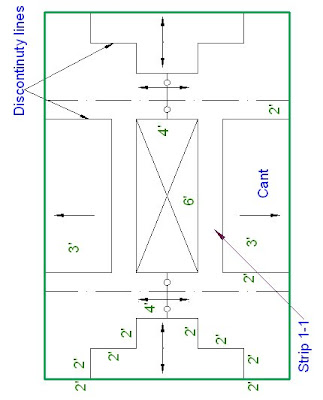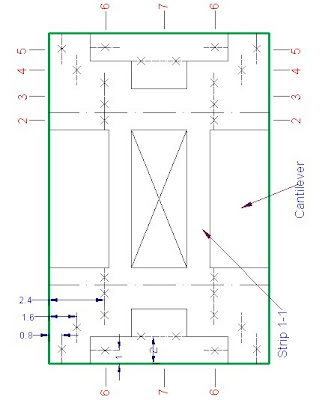In almost all constructions, slab system include openings. These may be of substantial size, as required by stair-ways and elevators shafts, or they may be of smaller dimensions, like those needed to accommodate heating, plumbing, and ventilating risers, floor and roof drains, and access hatches.
The strip method was first developed by Hillerborg, and later Wood and Armer analyzed the method critically and performed test on slabs designed by this method. They found that a design made by the strip method and reinforced exactly according to moments found, was an exact solution.
The strip method is the simplest one for slabs on simple supports, but continuity can be handled on a basis similar to limit design.The most difficult slabs for this method are slabs supported on columns. For such a case, Hillerborg developed the advanced strip method, using a rectangular element carrying load in two directions to a support at one corner of the element. The equilibrium equation for slabs is
The strip method is the simplest one for slabs on simple supports, but continuity can be handled on a basis similar to limit design.The most difficult slabs for this method are slabs supported on columns. For such a case, Hillerborg developed the advanced strip method, using a rectangular element carrying load in two directions to a support at one corner of the element. The equilibrium equation for slabs is

All elements of this equation, except w, follows the Timoshenko’s notation.
i.e., Mx and My = bending moment about respective directions.
Mxy = twisting moment.
Hillerborg
designs the slab to make Mxy unnecessary, that is he assumes Mxy = 0
and than apportions the load to ∂²Mx/∂x² and ∂²My/∂y², usually at a
particular spot wholly to one or to the other. This particular
apportionment is more of a convenience than a necessity, however, loads
in a particular area are assign to particular slab strips and continuity
of the resulting moments and shear must be carefully maintained.
Apparent discontinuity in torque or deflection may be disregarded, but a
discontinuity in moment or shear is not permitted. Both elastic and
plastic analysis concepts are permissible in evaluating moments on
strips.
The
suitability of the method for slabs with opening is a strong point in
its favor. This method have been using for many years by designers,
designing by their ‘feel’ for the way the load has most apt to be
transferred to the supports. As slabs are normally considerably
under-reinforced, it is possible to use certain strips near the opening
as small beam simply by increasing the local reinforcement. If the
opening is so large that even extra slab steel is inadequate to care for
the moment, a real beam is needed around one or more sides of the
opening, quite probably spanning to the edge beams. The assumed “beam
strips” are drawn as dotted around the opening and the point of
inflection as suggested by Wood and Hillerborg are added on the slab.
Then different moment for different strip is calculated. Depth can be
fixed from loads (moment and shear). The reinforcement should be
arranged in bends corresponding to the strips used, this calculation is
simple.
Defection at service load must be considered in
checking serviceability. In any actual design the service load is
available, and it should be on the safe side to use the strip service
load moments with EI based on the cracked section.




No comments:
Post a Comment